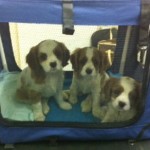How to care for your puppy:
Make sure that you have suitable transport for your new puppy. Puppies may be put in a collapsible cage in your car, which ensures they are safe during a journey. Be sure to have them on a lead/harness so that they can’t run away. Also before your puppy has its first vaccinations it is imperative that your puppy does not touch the floor outside (other than your garden) and is only introduced to dogs that are vaccinated.
-
Night Time:
Your puppy may whine about being left alone for the first few nights. Soft toys can be good company. If you are planning to train them to use a crate you can cover the crate to make them feel more secure. Leaving a radio station on (eg. Classic FM) quietly in the background can also help them to feel more secure. Sometimes a ticking clock can provide some company. A covered hot water bottle may also be a very warm friend (care though- it should be hand hot only – any hotter can cause burns).
-
Training:
Make sure to train and handle your puppy from an early age. Plenty of handling will make them comfortable with human contact. Reinforcing good play behaviours with treats is also recommended. When doing any training always give verbal praise first, and immediately after give a little treat. Eventually your puppy will be happy to receive the verbal praise alone. Get the puppy used to being checked over (like at the vets). Lift and handle the ears, try getting a dog toothpaste and brushing their teeth, with a finger brush. Lift and handle the paws. Be sure to expose your puppy to as many different people as possible whilst it is developing. This can include a person in uniform (eg. A postman), someone wearing a hat, someone with a beard even! Puppy classes are a great way to socialise them. Other puppies will help to teach your puppy how to behave in social situations.
For further tips on training your puppy see our other puppy and dog training blog post here
-
1st Vaccinations:
This can be done on the first vet check between 8-10 weeks of age. The 2nd vaccination is 2-4 weeks after. Until a week after the 2nd vaccination it is imperative that you keep the puppy away from un-vaccinated dogs and do not place him/her on the floor in public spaces where viruses could be on the ground.
-
Worming and parasite control–
Puppies will need to be wormed as most will have picked up worms from their mother. This can be done with either tablets, or with a spot on treatment, which will treat other parasites such as fleas and lungworm. Your vet will advise on the most appropriate treatment.
-
Exercise:
Puppies do not need long walks – they only have little legs! Puppies aren’t considered fully grown until 6-18 months of age (larger breeds mature more slowly). It is then that a good exercise plan can be implemented. Larger breeds especially may be prone to bone and joint problems, and should not be over exercised, when growing.
-
Food:
Little and often. A puppy’s tummy is very small and so their food intake needs to be split between 3-4 meal times. Find out what your puppy has been fed on at the breeder’s and try to maintain that regime for continuity. If your puppy has diarrhoea, give them boiled chicken and rice. Introduce any new puppy foods gradually over 3 days, as a sudden change in food will often cause a digestive upset.
- Play:
Puppies like to chew a lot especially during teething between the ages of 3 and 6 months, when they will lose all of their milk teeth. Provide rubber Kongs or rope chews. Avoid bones as they can crack their milk teeth on these. Play is an important way of learning for your new puppy and can be a lot of fun too!
Finally enjoy playing with your puppy – they grow up much too fast, and send your cute pictures to our facebook page here !



